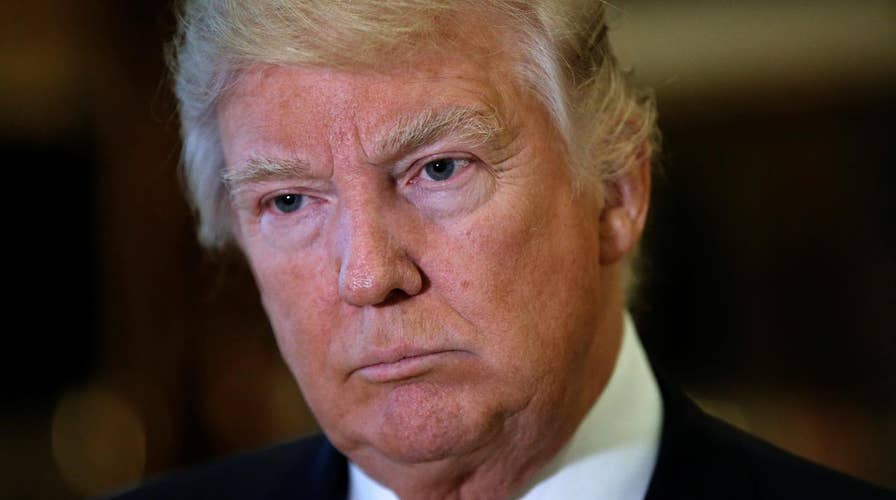The intense national debate over President Trump’s refugee executive order could be headed to the Supreme Court, as the dispute quickly works its way up the judicial food chain – while adding another dimension to the confirmation fight over the president’s pick to fill the high court’s vacancy.
"I have no doubt that it will go to the Supreme Court, and probably some judgments will be made whether this president has exceeded his authority or not," Senate Judiciary Committee ranking Democratic Sen. Dianne Feinstein told “Fox News Sunday.”
The president’s order suspending the U.S. refugee program as well as most travel and immigration from seven predominantly Muslim nations is on hold amid litigation, and currently before the 9th U.S. Circuit Court of Appeals in San Francisco.
Lawyers for Washington state and Minnesota already have told the court that restoring the ban would “unleash chaos again.” The Trump administration, which has voiced confidence the courts will reinstate the measure, has until 6 p.m. ET Monday to file its briefs to the same court, which already turned down a prior Justice Department request to immediately set aside a Seattle judge's ruling that put a temporary hold on the order nationwide.
The rapid-fire legal maneuvers by the two states were accompanied by briefs filed by the technology industry arguing that the travel ban would harm their companies by making it more difficult to recruit employees. Tech giants like Apple and Google, along with Uber, filed their arguments with the court late Sunday.
Trump's executive order was founded on a claim of national security, but lawyers for the two states told the appellate court the administration's move hurts residents, businesses and universities and is unconstitutional.
The 9th Circuit is generally considered the most liberal circuit in the country. Regardless of the outcome there, the Supreme Court soon could be asked to weigh in strictly on the question of the Trump order’s enforcement. Beyond that, the Supreme Court eventually could be asked to rule on the merits of the measure.
This possibility only complicates the debate on Capitol Hill over Supreme Court nominee Neil Gorsuch’s nomination. The high court remains split along ideological lines, 4-4, and Gorsuch’s confirmation could restore the conservative tilt that existed during the late Justice Antonin Scalia’s tenure.
Democratic senators skeptical of Gorsuch have used Trump’s immigration order – and his recent Twitter attacks against the judge standing in his way – to underscore the high stakes in the confirmation fight.
“With each action testing the Constitution, and each personal attack on a judge, President Trump raises the bar even higher for Judge Gorsuch's nomination to serve on the Supreme Court,” Senate Democratic Leader Chuck Schumer, D-N.Y., said in a statement Saturday. “His ability to be an independent check will be front and center throughout the confirmation process.”
Tim O’Brien, an attorney who covered the Supreme Court for two decades, noted Gorsuch would not be in a position to vote on the matter any time soon. But he suggested Trump’s Twitter criticism of District Court Judge James Robart could cause problems as the nominee meets with lawmakers.
“I don’t think that has helped,” he said on Fox News’ “Happening Now.”
Feinstein, who is meeting with Gorsuch on Monday, declined to comment Sunday on her initial views of the court nominee.
“I view the minority party's challenge to do a full and fair hearing, and to have the time to garner the facts to really understand the history of this nominee. And we will do that,” Feinstein said, adding: “I want the Democratic side to start out from a neutral base and really do the proper exploratory work and then be able to hold full and fair hearings.”
She also said, “the president is not a dictator … he is the chief executive of our country.”
Trump riled Democrats and some Republicans by blasting Robart, the judge who blocked his order, as a “so-called” justice.
"We don't have so-called judges," said Sen. Ben Sasse, R-Neb., on ABC’s “This Week.” "We don't have so-called senators. We don't have so-called presidents. We have people from three different branches of government who take an oath to uphold and defend the Constitution."
But Vice President Pence defended the president, saying the judge “made the wrong decision.”
“From the outset of his campaign and administration, the president of the United States has made it clear to put the safety of the American people first,” Pence said on “Fox News Sunday.” “We are going to win this argument.”
He argued that the president has the authority to impose such immigration restrictions.
Bob Ferguson, Washington state's attorney general, said, "we don't argue" that Trump has authority to act in the interest of national security. But in an interview on NBC's "Today" show, he also said "we have checks and balances" in the country, maintaining the president's order was "unconstitutional" and saying president's don't have "unfettered authorization" in these cases.
Trump's order applied to Iraq, Syria, Iran, Sudan, Libya, Somalia and Yemen -- Muslim-majority countries that the administration said raise terrorism concerns. The order had caused unending confusion for many foreigners trying to reach the United States, prompting protests across the United States and leading to multiple court challenges.
The State Department said last week that as many as 60,000 foreigners from those seven countries had had their visas canceled. After Robart's decision, the department reversed course and said they could travel to the U.S. if they had a valid visa.
The department also advised refugee aid agencies that refugees set to travel before Trump signed his order would now be allowed in.
The Homeland Security Department no longer was directing airlines to prevent visa-holders affected by Trump's order from boarding U.S.-bound planes. The agency said it had "suspended any and all actions" related to putting in place Trump's order.
The Associated Press contributed to this report.





